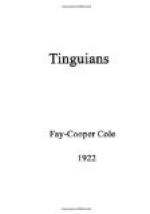When the danger period is past, the spirit at once leaves its old home, and returns again only at the time of the Layog. From that time on, he continues his existence in the upper world, neither troubling, nor being troubled by mortals on earth. [116] Ancestor worship does not occur here, nor are offerings made to the dead, other than those described above.
CHAPTER IV
RELIGION AND MAGIC
The Tinguian has been taught by his elders that he is surrounded by a great body of spirits, some good, some malevolent. The folk-tales handed down from ancient times add their authority to the teachings of older generations, while the individual himself has seen the bodies of the mediums possessed by the superior beings; he has communicated with them direct, has seen them cure the sick and predict coming events. At many a funeral, he has seen the medium squat before the corpse, chanting a weird song, and then suddenly become possessed by the spirit of the deceased; and, finally, he or some of his friends or townspeople are confident that they have seen and talked to ghosts of the recently departed. All these beings are real to him; he is so certain of their existence that he seldom speculates about them or their acts.
Some of these spirits are always near; and a part of them, at least, take more than an ordinary interest in human affairs. Thanks to the teachings of the elders, the Tinguian knows how to propitiate them; and, if necessary, he may even compel friendly action on the part of many. Toward the less powerful of the evily disposed beings, he shows indifference or insolence; he may make fun of, or lie to, and cheat them during the day, but he is careful to guard himself at night against their machinations. To the more powerful he shows the utmost respect; he offers them gifts of food, drink, and material objects; and conducts ceremonies in the manner demanded by them. Having done these things, he feels that he is a party to a bargain; and the spirits must, on their part, repay by granting the benefits desired. Not entirely content with these precautions, he performs certain magical acts which prevent evil spirits from doing harm to an individual or a community, and by the same means he is able to control storms, the rise of streams, and the growth of crops. It is doubtful if the Tinguian has ever speculated in regard to this magical force, yet he clearly separates it from the power resident in the spirit world. It appears to be a great undifferentiated force to which spirits, nature, and men are subject alike.
If a troublesome question arises, or an evident inconsistency in his beliefs is called to his attention, he disposes of it by the simple statement that it is kadauyan ("custom"), “was taught by the ancestors,” and hence is not subject to question.
His religion holds forth no threat of punishment in a future world, neither are there rewards in that existence to urge men to better deeds. The chief teaching is that the customs of ancient times must be faithfully followed; to change is to show disrespect for the dead, for the spirits who are responsible for the customs, which are synonymous with law.




